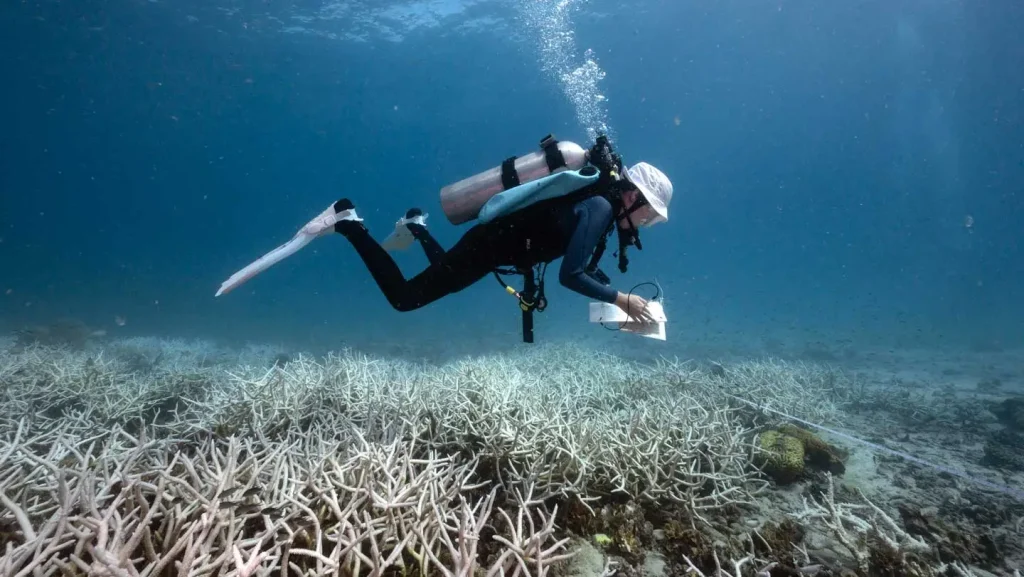Earth Enters New Climate Reality: The First Tipping Point Has Been Crossed
Our planet has officially crossed its first climate tipping point, marking the beginning of a grim new era in Earth’s climate history. According to the Global Tipping Points Report 2025, published on October 13, relentlessly rising ocean temperatures have pushed coral reefs worldwide beyond their limit of resilience. This unprecedented die-off of global reefs threatens not just marine ecosystems but the livelihoods of nearly a billion people who depend on them. Most alarming is the finding that even under the most optimistic warming scenario—limiting global warming to 1.5 degrees Celsius above pre-industrial levels—warm-water coral reefs are virtually certain to have passed a point of no return, making this “one of the most pressing ecological losses humanity confronts.”
This coral reef collapse represents just the first domino to fall in a potentially cascading series of climate tipping points. Since 2023, we’ve experienced over a year of temperatures exceeding 1.5 degrees Celsius above pre-industrial averages. According to Steve Smith, a geographer at the University of Exeter who researches tipping points, “Overshooting the 1.5 degree C limit now looks pretty inevitable and could happen around 2030. This puts the world in a danger zone of escalating risks, of more tipping points being crossed.” These tipping points represent thresholds beyond which Earth systems shift dramatically into new states, triggering cascades of irreversible effects. Under current climate policies, global warming is likely to reach approximately 3 degrees Celsius within decades—a level that could trigger multiple catastrophic tipping points, including the collapse of the West Antarctic Ice Sheet, widespread retreat of mountain glaciers, and potentially the failure of critical ocean current systems like the Atlantic Meridional Overturning Circulation (AMOC).
A decade after the historic Paris Agreement, in which nearly all nations committed to limiting warming to well below 2 degrees Celsius—preferably 1.5 degrees—we are witnessing a troubling retreat from climate commitments. “We are seeing the backsliding of climate and environmental commitments from governments, and indeed from businesses as well,” noted Tanya Steele, CEO of the UK office of the World Wildlife Fund. The report, compiled by over 200 researchers from more than 25 institutions, was deliberately released as ministers from around the world gather in Belém, Brazil for COP30, the annual UN Climate Change Conference. The timing and location are significant—2024 has already seen approximately 150 unprecedented extreme weather events, including the worst drought ever recorded in the Amazon rainforest. This vulnerable ecosystem now faces a grave threat from the combined effects of deforestation and climate change, with current deforestation levels approaching the critical threshold that could trigger widespread dieback.
There is, however, a glimmer of hope amid these concerning developments. Smith notes that “we’ve also passed at least one major positive tipping point in the energy system.” These positive tipping points represent paradigm shifts that can trigger cascades of beneficial changes. “Since 2023, we’ve witnessed rapid progress in the uptake of clean technologies worldwide,” particularly electric vehicles and solar photovoltaic technology, with battery prices for these technologies dropping significantly. These effects “are starting to reinforce each other,” potentially accelerating the transition away from fossil fuels. Nevertheless, simply reducing emissions or even removing carbon from the atmosphere will not be sufficient at this stage. What’s needed now is a wholesale paradigm shift in how governments approach climate change and mitigation strategies.
The report emphasizes that current systems of governance—including national policies, international agreements, and multilateral frameworks—were not designed to address the threat of tipping points. These systems were built to handle gradual, linear changes, not the abrupt, rapidly cascading effects occurring simultaneously across multiple Earth systems. “What we’re arguing in the report is that these tipping processes really present a new kind of threat,” explains Manjana Milkoreit, a political scientist at the University of Oslo and co-author of the report. The scale of this threat is so vast that it challenges our ability to comprehend it fully, requiring urgent and coordinated global action beyond anything attempted thus far in climate governance.
The researchers outline several critical steps that decision-makers must take immediately to prevent crossing additional tipping points. First, rapidly cutting emissions of short-lived pollutants like methane and black carbon could buy precious time. Second, efforts to remove carbon from the atmosphere must be dramatically scaled up. Third, both governments and individuals need to work toward making global supply chains sustainable, reducing demand for products linked to deforestation. Finally, governments must develop comprehensive strategies to address multiple climate impacts simultaneously. These actions aren’t optional or selective—they represent the minimum necessary response to our current crisis. While acknowledging the enormity of this challenge, Milkoreit emphasizes the importance of engagement: “Even for a reader to have the courage to stay with the trouble is work, and I want to recognize that work.” The time for half-measures has passed; only bold, coordinated action can help humanity navigate the perilous climate reality we now face.















